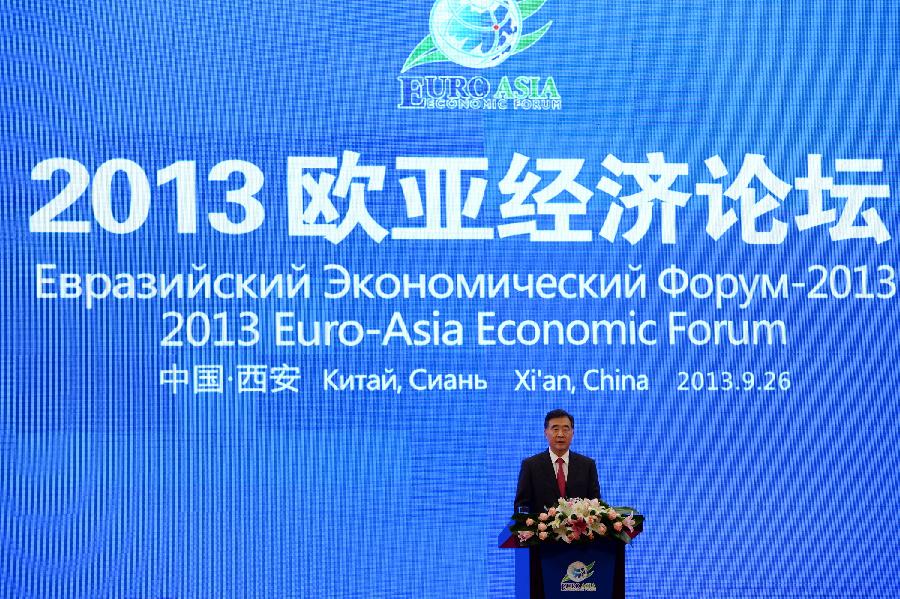Silk Road economic belt focus of Euro-Asia forum
 0 Comment(s)
0 Comment(s) Print
Print E-mail Xinhua, September 26, 2013
E-mail Xinhua, September 26, 2013
| Chinese Vice Premier Wang Yang, also a member of the Political Bureau of the Communist Party of China (CPC) Central Committee, addresses the opening ceremony of the 2013 Euro-Asia Economic Forum in Xi'an, capital of northwest China's Shaanxi Province, Sept. 26, 2013. [photo / Xinhua] |
The fifth Euro-Asia Economic Forum opened in Xi'an on Thursday with the Silk Road economic belt high on the agenda.
Chinese President Xi Jinping's proposal for the Silk Road belt has brought unprecedented opportunities for regional development, said Chinese Vice Premier Wang Yang at the opening ceremony of the forum.
Eurasian countries should push forward with more, higher level, broader regional cooperation, with a firmer resolve and more practical measures, to make the idea a reality as soon as possible for the benefit of the people, said Wang in his keynote speech.
He stressed mutual political trust and common development in the region, calling for opening up and fighting protectionism in all forms, promoting mutual understanding and deepening friendship by expanding exchanges in education, culture and tourism.
The three-day conference in Xi'an, capital of northwest China's Shaanxi Province, attracted about 2,000 delegates from 75 countries, regions and international organizations, including foreign leaders such as Afghan President Hamid Karzai and Ukrainian First Vice Prime Minister Serhiy Arbuzov.
Themed "deepening pragmatic cooperation and promote common prosperity", the forum features eight main seminars on cultural heritage, ecological safety, economic growth, education, energy development, financial cooperation, new technology and tourism development.
Afghanistan supports Silk Road economic belt proposal and wants to be part of regional cooperation, said Karzai at the opening ceremony.
During his visit to Kazakhstan in early September, Chinese President Xi Jinping put forward the proposal of a Silk Road economic belt to deepen cooperation and make economic ties closer among European and Asian nations.
The Silk Road refers to the land trade route opened when Zhang Qian was sent west on a diplomatic mission more than 2,000 years ago. Starting from the city known today as Xi'an, the ancient Silk Road ran through northwest China's Gansu Province and Xinjiang Uygur Autonomous Region, and Central and Western Asia, before reaching the Mediterranean.
China remains a developing center to the whole world and China's development brings opportunities to other countries, said Serhiy Arbuzov.
Shaanxi, near the geographical center of China, plays an important role in China's opening up to the West, said Governor Lou Qinjian.
The province will focus on its distinctive industries and realize win-win outcomes with Eurasian countries, said Lou.
Xing Guangcheng, researcher with the Chinese Academy of Social Sciences, said the Silk Road economic belt could take a long time and it is important to strengthen exchanges and build mutual trust.
The Silk Road is not only a trade route, but also a route of culture and peace. The Euro-Asia Economic Forum serves as a good platform for communication, but more exchange and cooperation are necessary, said Sun Zhuangzhi, another expert in Central Asia studies.
Currently, infrastructure along the Silk Road such as roads and pipelines have been initially completed, but more effort in mechanisms for trade and investment are needed, said Feng Zongxian, an professor of economics at Xi'an Jiaotong University.
A vital precondition is for countries to have an open, inclusive and win-win mindset, said Feng.







Go to Forum >>0 Comment(s)